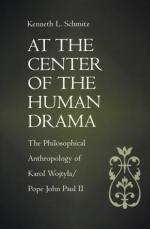|
This section contains 6,707 words (approx. 23 pages at 300 words per page) |

|
Modern philosophical anthropology originated in the 1920s. During the 1940s it became the representative branch of German philosophy. It arose with, and has absorbed, Lebensphilosophie, existentialism, and phenomenology, although it is not identical with them. It has affinities with pragmatism and the sociology of knowledge. Although it is historically based on certain German traditions, it is also indebted to, and largely anticipated by, the eighteenth-century "science of human nature." It combines the critical traditions of the Enlightenment with an emphasis on dogmatic certitude.
Historical Background
Following Bernhard Groethuysen, philosophical anthropology is often conceived as embracing all previous philosophy, insofar as previous philosophy dealt with man's place in the world. But this wide conception blurs the distinctive features of philosophical anthropology. Its history is best restricted to those authors and ideas whose impact is either admitted or can be traced in the literature of modern philosophical anthropology...
|
This section contains 6,707 words (approx. 23 pages at 300 words per page) |

|


